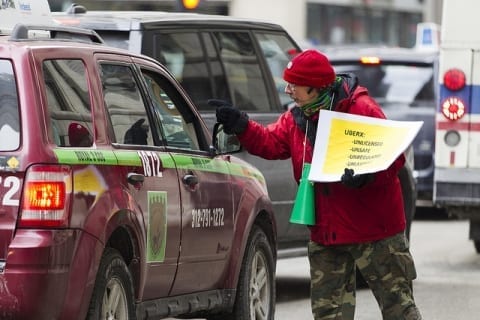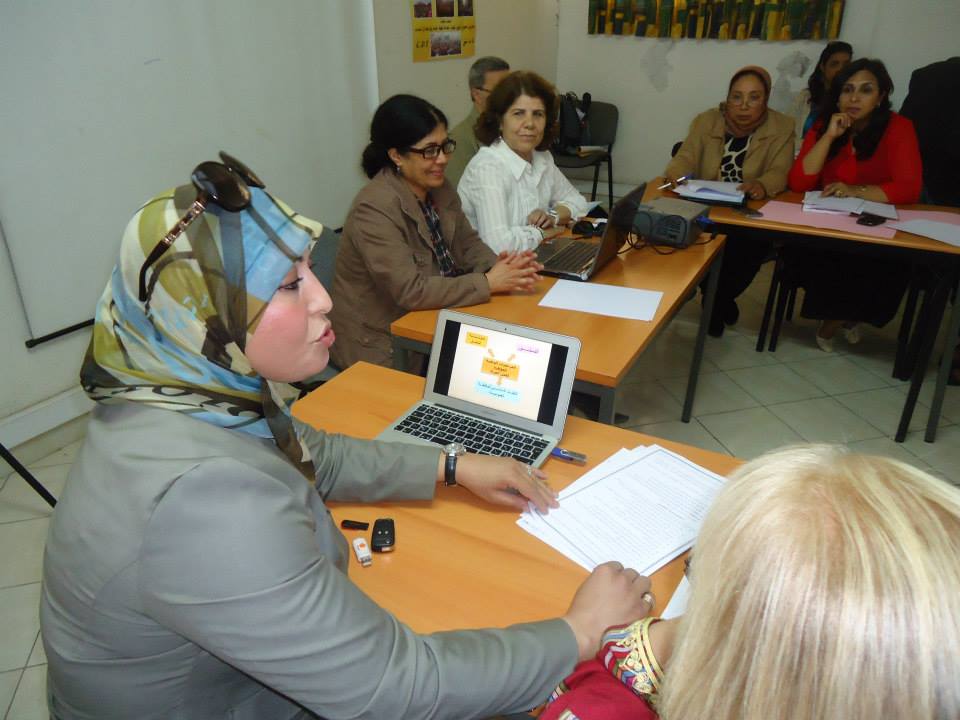
Mar 20, 2015
United Nations Women announced today it is cutting ties with the ride share company Uber, after unions and other civil society groups protested that the company’s business model perpetuates precarious work—job instability, lack of health insurance and other social benefits, and little labor law protection.
Uber had said it would create 1 million jobs for women, a benchmark unions say is meaningless unless those jobs are stable, safe and provide wages sufficient to support families.
“There was an immediate rejection by unions and NGOs (nongovernmental organizations) of this idea of a million jobs that we knew were likely to be insecure, ill paid and potentially unsafe,” says Brigitta Paas, International Transport Workers’ Federation (ITF) vice president.
The decision to partner with Uber, announced during the opening days of the Commission on the Status of Women (CSW) meeting last week, outraged CSW participants, who organized a global union statement and public protest.
“Uber economics is the most aggressive informalization of an industry which was already deregulated three decades ago,” the global union Public Services International (PSI) said last week. “Indeed, it represents exactly what the women’s movement has been fighting for decades.”
In many cities and countries, taxi drivers are union members with good wages and benefits, the opposite of the Uber model. By classifying drivers as “independent contractors,” Uber denies them basic protections, from minimum wage pay to health care and other benefits on the job. PSI cited Uber research that “revealed drivers’ average annual earnings of $15,000 and a proliferation of part-time work.”
Further, says International Trade Union Confederation (ITUC) General Secretary Sharan Burrow, “Uber does not create jobs—it replaces existing, regulated, taxi jobs with low-paid, precarious and exploitative work.”
“Unions rose up at the CSW, analyzed why the partnership was harmful to women and showed how unions and the economic empowerment they fight for, are key to gender equality,” says Lisa McGowan, Solidarity Center senior specialist for gender equality. “Decent wages, social benefits, stable employment—all are fundamental to achieving gender equality.”

May 13, 2014
In Algeria, Tunisia and Morocco, women are taking concrete steps through unions to achieve social and economic justice and decent work, achievements possible when women are substantively involved in decision-making in their unions, their community and civil society.
In Algeria, the Women’s Committee of the Syndicat National Autonome des Personnels de l’Administration Publique (SNAPAP) has reached out to 600 marginalized and vulnerable women across 11 provinces through educational outreach and study circles. SNAPAP leadership recognizes that despite women’s active social and economic participation, they still face blatant discrimination in their workplaces and communities, harassment, violence, and exploitation on the job.
The Women’s Committee runs study circles with the Regional Algerian Women’s Legal Empowerment Network and with support from the Solidarity Center. During study sessions, the women learn their legal rights under national laws and international conventions. They also are supported in overcoming fears that keep them from challenging repression and violations of their rights, even those often condoned by their societies.
Amid ongoing global economic insecurity, millions of workers are struggling to find jobs that pay a living wage—and the most vulnerable are women, who are more likely to toil in jobs without coverage under formal labor law or social protections, leaving them open to discrimination and exploitation.
The study circles provide a safe place where women can freely talk about their experiences. In recent months, they have described ongoing exploitation in the workplace and at home. All have detailed low wages, long working hours, abusive transfers and dismissals, discrimination, sexual harassment, physical violence and a lack of social protection.
A woman union activist from Adrar, in southwest Algeria, describes how women workers struggle economically in the region, despite the country’s oil and gas wealth. To survive in Adrar, some women work in stone quarries using their bare hands to fill trucks with rocks and gravel for private sellers. Three women recently died from dehydration.
“Surprisingly, all the basic rights that women should enjoy, such as health coverage and decent living wages, are not being enjoyed by women of the south. Some women tried to change their situation through training, but their certificate of completion was rejected by all the businesses and enterprises in the south, which led women to be marginalized,” said the activist. She added that the women, “work in an unsafe environment and are vulnerable to harassment.”
In Tunisia, where women are playing a key role in enshrining articles in the constitution that guarantee equality and parity, women in the Union Générale Tunisienne du Travail (General Union of Tunisian Workers, UGTT) are now working to advance women’s roles in their union. They are uniting under the theme, “Partners in social activism, partners in decision-making,” to highlight their essential role in the country’s 2010–2011 uprising and the subsequent democratic transition. UGTT women are campaigning for creation of a quota that would ensure women comprise a minimum percentage of elected officers and members of UGTT decision-making bodies.
Women union members also have been active in UGTT’s push to remove all of the country’s reservations to the United Nations on the Convention on the Elimination on all Forms of Discrimination against Women (CEDAW). These reservations had enabled Tunisia to opt out of certain provisions, including women’s rights within the family, even though the country had ratified the treaty.
The Confederation Democratique du Travail (Democratic Labor Confederation, CDT) in Morocco is laying the groundwork for a advocacy campaign to ensure the consistent application and enforcement of women’s rights. The CDT’s Women’s Committee is laying the groundwork to “give more visibility to the demands of women workers.” The CDT released a memorandum, “Work is a right, with guaranteed dignity and equality,” at a well-attended press conference last month and plans a coordinated workers’ advocacy campaign for women workers.
Jul 9, 2012
Two groundbreaking pieces of legislation are poised to bring 300,000 domestic workers in the Dominican Republic into the national social security system, providing them for the first time with a minimum wage, health care, pension, and other social protections to which formally employed Dominican workers are entitled.
Dominican domestic workers—the vast majority of them women—do not earn a living wage; indeed, 50 percent of their meager earnings are often received as in-kind goods, food, and lodging at their place of work. They have no maternity leave, pension, health care coverage, or vacation time. Under the new plan, they would be entitled to receive a pension as well as disability, survivor, family and occupational health insurance, and other basic benefits.
“In the labor movement, we are confident that the Social Security system will cover domestic workers,” said Eulogia Familia, vice president and coordinator of policies for equity of the National Confederation of Unions (CNUS), a Solidarity Center partner. “The best way to begin to lift domestic workers out of exclusion and poverty is by affiliating them to the social security system. The approval of these laws will generate an advance for women and men who are domestic workers.”
Famila was referring to the likely ratification of International Labor Organization (ILO) Convention 189, Decent Work for Domestic Workers, and to legislation drafted by Sen. Adriano Sánchez Roa. Sánchez Roa’s worker rights bill, first presented last year, includes establishing a minimum wage for domestic workers and health coverage by the Dominican Institute for Social Security. Sánchez Roa has not yet introduced his bill in this session of the Senate, as he is waiting for ratification of Convention 189, according to Familia.
In a July 5 meeting with Familia, other labor leaders, and domestic workers, Dr. Reinaldo Pared Pérez, president of the Dominican Senate and secretary general of the governing Dominican Liberation Party (PLD), told the unionists that the Senate is going to support the ratification of Convention 189. He went on to say that on Tuesday July 10, the Senate will discuss Convention 189 and later send it for study in the appropriate commission of the Senate.
His announcement comes on the heels of a public commitment by the minister of labor, Francisco Domínguez Brito, at the National Forum on Decent Work for Domestic Workers, held on June 28. At the forum, organized by the Inter-Union Committee for the Woman Worker (CIMTRA), Domínguez Brito pledged to lobby senators for passage of the convention. CIMTRA brings together women from this Caribbean island’s three labor confederations. Also present at the forum were Sharan Burrow, secretary general of the International Trade Union Confederation; Dominican labor leaders; representatives of various NGOs; governmental offials; and local representatives of the ILO.
The Solidarity Center’s partners in the Dominican Republic, who have been advocating for many years for the rights of all informal workers, continue lobbying to make these protections a reality. With Solidarity Center support, they have conducted public awareness campaigns, organized domestic workers, and educated Haitian migrants on their rights as domestic workers.
The government pledged to ratify Convention 189 after its adoption more than a year ago, but the legislation had stalled. While ratification of the convention and the Sánchez Roa bill is likely to move forward in the Senate, it may run into trouble in the House of Deputies, according to Familia, as a result of one influential legislator’s resistance to sections that specifically address migrant workers.


